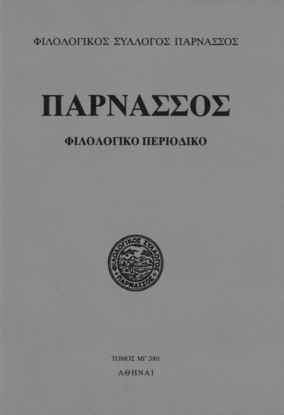Ποια ήτο η έννοια της επί ασέβεια κατηγορίας του Σωκράτους και ποιαι αι επιπτώσεις της καταδίκης του
Part of : Παρνασσός ; Vol.ΚΒ, No.1, 1980, pages 16-28
Issue:
Pages:
16-28
Parallel Title:
What was the meaning of the charge of impiety against Socrates and what where the sequels of his condemnation ?
Author:
Abstract:
The accusation of impiety against Socrates is cited by Xenophon and others. However, we are not certain if Xenophon cites it textually, because of adding, that it sounded approximately thus. The chief accuser of Socrates was the poet Meletos, backed by the politician Anytos. In antiquity it was believed, that the orator Polycrates wrote the indictment against Socrates. In fact, his pamphlet must be dated about 15 years later. Probably it was a reply to the Apology of Plato. The charge of impiety prevailed in the accusation of Socrates, as can be inferred from the summons to appear before the magistrate basileus, who was in charge for all religious matters. Possibly,however, the religious charge was only a smoke screen to cover the underlying political motives. The charge against Socrates contained two or possible three clauses. The first one is, that he either did not believe in the official State gods or that he did not worship them. The first meaning of the verb was used by Plato in his Apology, while Xenophon follows the second. From the decree of Diopeithes can be inferred/that the charge of impiety was principally brought against persons who were doubting the divine power of the Olympians. Accordingly, the persecution for impiety presupposes either atheistic teaching or the performance of impious deeds. The charge of the second clause was, that Socrates introduced into the worship the cult of new gods (or demons). Therefore, the first clause could not have been a charge of atheism. Aristophanes in the Clouds, charges Socrates of teaching cosmological theories, similar to those of Anaxagoras and of his teacher Archelaos. Nevertheless, the disciples of Socrates absolutely deny such a teaching. Plato, Xenophon a.o. assert that the second clause was directed against the personal demon of Socrates. This, however, is improbable, because in the charge the plural δαιμόνια is used. It is, therefore, more probable, that the apologists of Socrates have introduced his personal demon, in order to obscure the meaning of the second clause. Anyway,Socrates was found guilty and condemned to drink the cup of hemlock. However, his condemnation was certainly followed by other sanctions. One of them was the confiscation of Socrates’ property. This can be inferred from the decree of Isotimides and from the confiscation of the property of his disciple Phaedros for ridiculing the Mysteries. Another sanction was the refusal to permit the burial of his body in Attika as accursed by the gods. According to Xenophon and Plato, the bodies of the executed sacrilegious or impious were thrown outside the confines of Attika or into the barathron. The refusal of burial in the case ofSocrates may explain the lack of information about the emplacement of his tomb and why not memorial services are mentioned of being held on it by his disciples.
Subject (LC):




